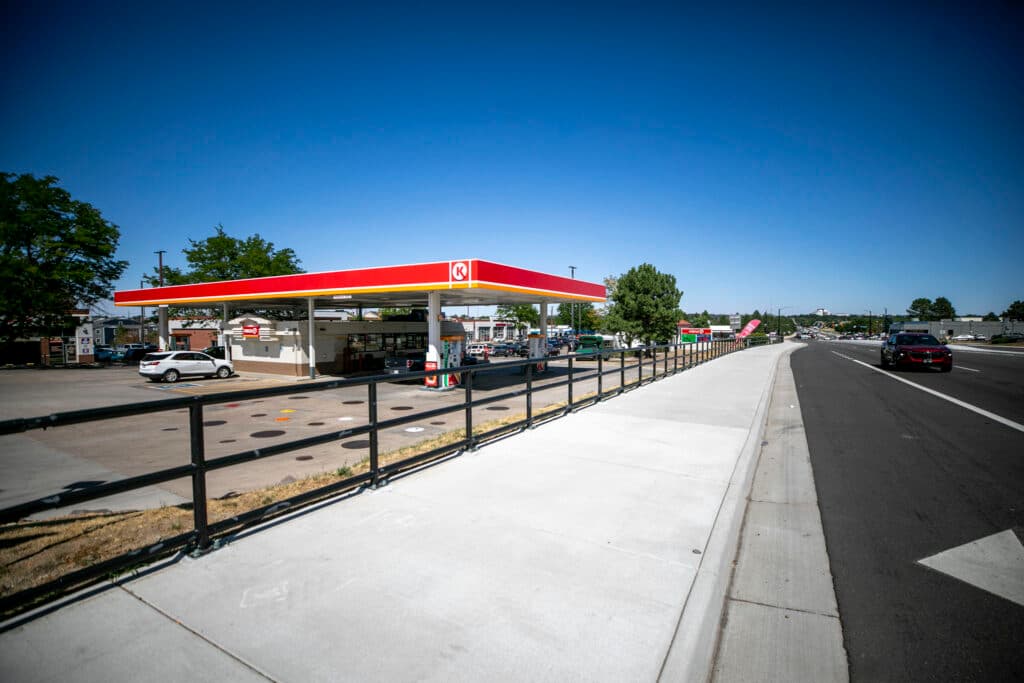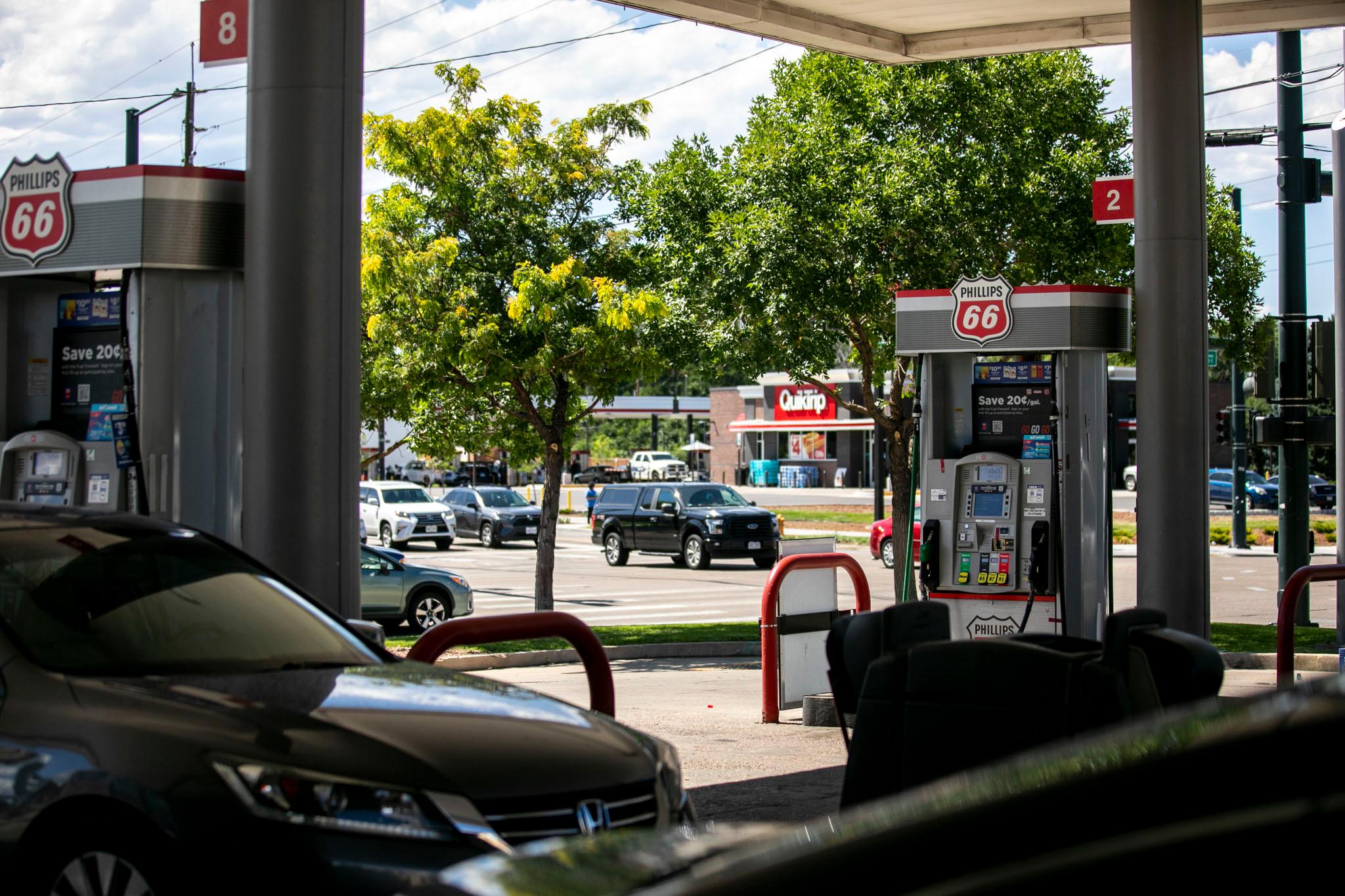The Denver City Council on Tuesday blocked the construction of gas stations near train stops, low-density residential neighborhoods and existing gas stations.
The sponsors say the ban will open up more land for housing, restaurants and other uses.
“Gas stations consume a large amount of land for the purposes of vehicle parking and maneuvering, and are known for low‐wage retail jobs,” a report from the city planning office stated.
But commercial real-estate developers objected to the new law as an unconstitutional overreach that would stifle development in Denver.
City Councilmembers Diana Romero-Campbell, Amanda Sawyer and Paul Kashmann sponsored the bill. It passed on a 12-1 vote, with Councilmember Flor Alvidrez opposing it.
Where gas stations are now banned:
The code change prohibits the construction of new gas stations:
- Within a quarter mile of an existing gas station
- Within a quarter mile of a rail transit station platform
- Within 300 feet of low-intensity residential zone districts, dedicated to single- and two-unit buildings.
Existing stations also could face new limits if they fall into those categories. They could be blocked from adding more gas pumps, though they could add electric vehicle chargers and replace existing gas pumps.
The law would still allow the city’s zoning administrator to waive restrictions if the new gas station is coupled with large grocers and other retailers. The new law wouldn’t apply to non-public stations, like the ones that serve government fleets and rental cars.
The bill does not include any particular incentives for developers to build housing instead of gas stations.
Here's where gas stations could go before:

And where they're allowed now:

Developers object: 'patently unfair'
The law would apply retroactively, allowing the city to block new gas station proposals that were submitted after May 13, 2024. Backdating the law could violate the Colorado constitution, according to commercial real estate groups.
“It just seems patently unfair — and according to the legal analysis, unconstitutional — to suddenly say, ‘Oh, just kidding, we're changing the zoning back to a date before you started your process.’” said Kathie Barstnar, the executive director of NAIOP Colorado, a commercial developers’ association
Mike Quinlan, with NavPoint Real Estate, estimates seven projects will be affected by the backdating of the law.
Doing so, Barstnar said, will ultimately erode trust in the city, with developers fearing lawmakers will change development rules even after project plans are submitted.
Advocates countered that the city had enough gas stations.
“What our residents have said is, ‘We want to see housing. We want to see small businesses. We want to see coffee shops where we can go hang out with our friends that we can walk to down the street from our house,’” said Councilmember Sawyer, when the bill was first introduced in June 2024. “Nowhere in any of that feedback did we hear from people, ‘We want more gas stations.’”
Most of the opposition at Tuesday’s council meeting came from the convenience chain QuikTrip and landowners, attorneys and developers partnering with the company.

The proposal drew roughly two hours of public comment.
Nearly 30 people were signed up to speak.
Many argued for the environmental benefits of slowing down gas station development, especially near residential neighborhoods.
David Pardo, a spokesperson with YIMBY Denver, said his pro-housing organization generally supported the measure. But members were concerned that gas stations could still be built near apartment buildings and condos.
Matthew Kulbe spoke in opposition. He said he represented a retired woman who had planned to sell a plot of land to a gas-station builder, whose retirement is now at stake.
The retroactive nature of this “violates the state’s constitution and private property rights,” he said.
David Sirota, the journalist and former political professional, described the absurdity of having nine gas stations in his southeast Denver area.

“These facilities are not good — environmentally speaking, ecologically speaking, public health speaking — for our residential neighborhoods,” Sirota said.
Jill Osa expressed gratitude for the proposal and how it would affect her children.
“While gas stations are a necessity, the reality is Denver doesn't need more of them,” she said.
Representatives of QuikTrip spoke against the ban, as did residents who had planned to sell property to the company. They were joined by academics, attorneys and real estate industry leaders, with much of their criticism focusing on the retroactive nature of the law.
Many described the bill as illegal, and some pledged taking legal action if it passed, arguing it would waste taxpayer dollars.
Anshul Bagga, of the City Attorney’s office, said the city objects to the notion that the law would be unconstitutional, though he didn’t explain why.
One councilmember opposed the bill.
The council voted 12-1 to pass the measure.
“Developers and their lawyers are an interesting breed. They tell compelling stories about property rights and [their] own project, not caring at all about its effect on adjacent properties,” said Councilmember Kashmann of the bill’s critics.
Kashmann questioned whether the bill is restrictive enough, pointing to other communities that have capped the number of gas stations that can be built.
Sawyer pointed out gas stations can still be built on 10,000 acres in the city. She also hinted she might be looking at similar restrictions on drive-thru restaurants.
“Building new gas stations now is like building more Blockbusters in the age of Netflix,” said Councilmember Chris Hinds, arguing Denver doesn’t need more gas stations.
Flynn said he was concerned “about the retroactive nature of this." Nonetheless, he supported the general goals of the bill and decided to vote in favor of it.
Flor Alvidrez was the sole councilmember who opposed the bill, arguing it would not serve as an affordable housing fix. She liked the idea that residents could get food and a bathroom at a gas station.
Councilmember Gilmore, meanwhile, objected to the idea that gas stations are a fix to food deserts.
“My residents deserve something better than a bag of Doritos, a banana and a Coke,” she said. “I hope we never again talk about gas stations as food access, healthy food access for residents.”











